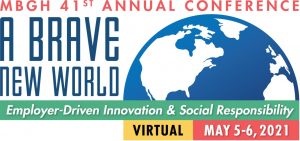Practice Transformation
Provider burnout has grown to “potentially catastrophic” levels, writes MGMA President and CEO Dr. Halee Fischer-Wright. Worklife happiness has dropped from 69% pre-pandemic to 49%, according to Medscape’s National Physician Burnout & Suicide Report 2021; the repercussions will be felt for decades, she warns. “We recognized years ago that relying on burned out providers makes it impossible to achieve cost-effective, high-quality, satisfying care. To avoid blows to accessibility, patient trust and engagement, and the financial stability of the healthcare system, we need to take comprehensive, collaborative action.” (Modern Healthcare*; report)
We know primary care physicians are overwhelmed. Here’s another example: Pediatric primary care clinicians frequently screen parents for smoking but rarely provide smoking cessation counseling, according to research from PLoS One. With competing priorities, pediatricians often lack the time to make smoking cessation discussions a priority during well-child visits.” Clinicians agreed that smoking cessation counseling was important, but they acknowledged that other issues are of higher priority than smoking cessation/prevention counseling. Lack of reimbursement was not a barrier raised by the clinicians,” according to authors. (Healio; PLoS One)
ting quality and service standards for integrated care and a capitated, risk-adjusted model for primary care. (MedPage Today; BPC forum)
A new paper looks at how CMM contributes to the foundational elements of primary care. Pharmacists work with the patients and providers to optimize the patient’s medication regimen, and they improve coordination by collaborating with specialists and others in the patient’s health care team around optimization of a patient’s medications, according to a paper published in the Journal of the American Board of Family Medicine. “The provision of CMM addresses critical unmet medication-related needs in primary care and is aligned with the foundational elements of primary care.” (Journal of the American Board of Family Medicine; News Medical)
Evidence & Innovation
In 20 years, telepharmacy has gone from a pilot project to practice in 25 states, Drug Topics reports. One advantage is the ability to spend more time with patients. “Having a pharmacist directly involved in care improves patient outcomes,” says Adam Chesler, PharmD, MBA, senior vice president for pharmacy integration at VillageMD, a network of primary care clinics, “By integrating a pharmacist into primary care, we have shown significant, sustained increases in medication adherence to treat cholesterol, diabetes, and hypertension. We can …[have] a conversation between the pharmacist, physician, and patient anywhere, anytime.” (Drug Topics)
Pharmacists and community health workers (CHWs) have become of part of the nation’s frontline response to COVID-19. Pharmacists play a unique role in addressing vaccine hesitancy, helping ensure equitable distribution and access. “These trusted messengers are central to reaching vulnerable communities and addressing determinants of poor health, which have been exacerbated by the pandemic,” according to the National Institute for Health Care Management (NIHCM) Foundation. NIHCM recently held a webinar outlining opportunities and strategies to support these workers and strengthen their ability to improve public health and promote health equity. (NIHCM webinar)
Policy Solutions
Most large commercial health plans post information about their specialty drug coverage policies on their websites. However, the information provided varies considerably and typically fails to explain the rationale for coverage decisions. This lack of transparency matters because plans vary substantially in how they apply coverage restrictions, according to the authors of a recent Health Affairs blog post. “Whatever the catalyst, a change is overdue. A lack of coverage policy transparency results in patients having differential access to care for reasons unknown. Patients and physicians should be able to understand how their access to care was determined.” (Health Affairs)
Note: sources that have an asterisk require login to view the article.
In Case You Missed It!
As a leader in the health care field, your opinion on issues facing the health care industry today is crucial.
Because the GTMRx Institute is committed to keeping a pulse on what matters, we’ve developed a quick two?-minute survey to gather feedback on issues in health care and pharmaceutical care management.
We’d be grateful for your participation. Please respond by no later than April 21. Take the survey here.
Streamed Live on April 6 on CSPAN
On April 6, The Bipartisan Policy Center and the Get the Medications Right Institute (GTMRx) convened a panel discussion to identify ways to build vaccine confidence and overcome vaccine hesitancy in local communities. During the session, GTMRx announced the formation of a new National Taskforce: Building Vaccine Confidence in the Medical Neighborhood. In order to offer a “level-setting” tool for the Task Force as they begin crafting recommendations to overcome barriers and build vaccine confidence in local communities, GTMRx has commissioned a report: Background and Resources to Build Vaccine Confidence in the Medical Neighborhood. You can watch a recording of the event here.

AmazonSmile is an easy way for 0.5% of your qualified purchases go to the GTMRx Foundation at no cost to you. And signing up is simple—go to smile.amazon.com and select “Get the Medications Right Foundation” as your charity of choice. If you prefer to directly donate instead, you can do so here.
Adding the foundation on AmazonSmile will help us continue to provide no cost educational webinars, issue briefs, weekly news briefs and promote the need for transformation of our current system of medication use through social media campaigns.



